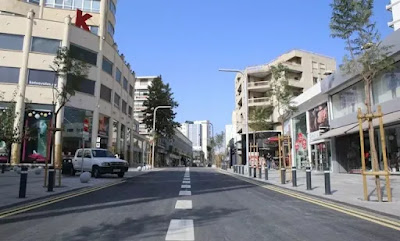Filenews 31 May 2025 - by Vasos Vassiliou
Taxpayers must prepare to put their hand in their pockets to pay the cost of the decision of the Nicosia City Council to open Makarios Avenue to all vehicles. Already, the Nicosia urban transport company NICOSIA PUBLIC TRANSPORT, which also manages the "Pame Express" program, is calculating the sum regarding the compensation it will claim from the Ministry of Transport in case of implementation of the decision. These costs are in addition to the costs of a possible EU decision to reimburse funds made available by the Union in the form of co-financing.
The cost will not only be borne by the citizens of Nicosia but by all Cypriot citizens/taxpayers, due to the impact that is expected to be caused to the Pame Express program which is funded by the Ministry of Transport.
The company has already sent a letter to the Mayor of Nicosia, Charalambos Prountzos, under the title "Opening of Makariou Avenue to General Traffic" in which there is a clear reference to claiming compensation for the losses that will arise as a result of the decision of the Municipal Council.
Specifically, the letter also records the following: "We must point out that, based on our surveys, more than 70% of our passengers stated that they have personal mobility options, such as cars. If the more than 35,000 people who today rely on public transport every day were to use their cars, this would lead to absolute chaos for our city.
» The Pame Express service works efficiently, even without the full infrastructure ready, and proves that Cypriots have the ability to leave their car outside the city and make use of public transport. The implementation of the Pame Express manages to eliminate approximately 157,000 car journeys within the city of Nicosia with the use of just 5 buses. The opening of Makariou Avenue to general traffic will, most likely, lead to a situation where we will have no choice but to stop the service and for which we reserve the right to assert all our legal rights through legal action against the municipality. An additional consequence concerns the fact that we will have to be compensated by the Ministry of Transport for our losses, due to the decision to open Makarios Avenue".
In light of these points, the company "warmly calls on the Council to reconsider its decision to open Makarios Avenue to general traffic".
Openness runs counter to EU policies and objectives
The letter, signed by the CEO, Julio Elias Tironi Vanzan, states, among other things, that the opening of Makariou Avenue to general traffic contradicts the principles of mobility and the European Union's policy on climate change, while it also contradicts the goals of the European Green Deal, while also affecting the goal of reducing emissions by 55%. "By opening Makariou Avenue to general traffic, the Council is undermining these priorities, jeopardising both national and international commitments to promote urban mobility solutions that are environmentally and socially responsible," the letter added.
It is also noted that, "perhaps the most worrying thing is the lack of public consultation on the decision of the municipal council", while the following are also noted:
>> "It came to our attention that the voices of stakeholders, including the more than 400,000 passengers who rely on public transport each month, were not invited to participate in the council's discussions. This exclusion raises significant concerns about transparency and inclusiveness in the decision-making process. Effective governance requires not only the adherence to strategic objectives, but also the active participation of citizens and all stakeholders."
>> "Urban public transport has more than 350,000 passengers who will be affected every month by this measure. On average, each month these people will spend more than 1,257 hours on buses compared to the current month. Adding up all the hours that all passengers will spend on the buses, we reach the incredible number of 15,086 total hours per year. This is the number of most hours that you are forcing the citizen of Nicosia to suffer with this measure."
The letter also underlines the following:
The opening of Makariou Avenue to general traffic is contrary to the principles of mobility and the European Union's climate change policy. Moreover, the measure runs counter to the objectives of the European Green Deal, which seeks to achieve climate neutrality by 2050 and reduce net greenhouse gas emissions by at least 55% by 2030. It also ignores the Zero Pollution Action Plan (2021), a cornerstone of the 'Green Deal' which aims for a 'toxic-free environment' by 2050. This plan includes specific targets for 2030, such as:
• Air: Reduction of premature deaths from air pollution by 55%.
• Noise: Reduce the number of people who are chronically disturbed by transport noise by 30%.
In addition, the decision undermines the Fit for 55 package, which includes legislative proposals that are crucial to achieving the 55% emissions reduction target.
And the company's CEO concludes:
"As you may already know, over 320 cities across Europe have implemented active low emission zones (LEZs) since 2025 – an increase of 40% from 2019. These LEZs are designed to reduce air pollution by encouraging the use of cleaner transport options as well as improving public health. The opening of Makarios Avenue would contradict this trend, ignoring clear evidence of the benefits that such restrictions bring to the urban environment."
